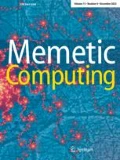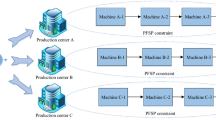Abstract
The single-factory manufacturing is gradually transiting to the multi-factory collaborative production with the globalization. The decentralization of resources and the heterogeneity of the production modes make it difficult to solve this kind of problem. Therefore, the distributed assembly flexible job shop scheduling problem (DAFJSP) is studied. DAFJSP can be decomposed into several flexible job shop scheduling problems and several single machine factory scheduling problems. To begin with, a mixed integer linear programming model for the DAFJSP is formulated to minimize the earliness/tardiness and the total cost simultaneously. Then, an improved differential evolution simulated annealing algorithm (IDESAA) is proposed. The balanced scheduling algorithm is designed to trade off the two objectives. Two crossover and mutation operators are designed. Due to its strong robustness, simulated annealing is integrated to local search the best Pareto solutions. The greedy idea combined with the Non-Dominated Sorted selection is employed to select the offspring. Finally, comprehensive experiments are conducted and the results show that the proposed algorithm can solve DAFJSP effectively and efficiently.
















Similar content being viewed by others
References
Akram K, Kamal K, Zeb A (2016) Fast simulated annealing hybridized with quenching for solving job shop scheduling problem. Appl Soft Comput 49:510–523
Behnamian J (2016) Graph colouring-based algorithm to parallel jobs scheduling on parallel factories. Int J Comput Integr Manuf 29(6):622–635
Behnamian J, Ghomi SMTF (2016) A survey of multi-factory scheduling. J Intell Manuf 27(1):231–249
Behnamian J (2017) Matheuristic for the decentralized factories scheduling problem. Appl Math Model 47:668–684
Bonomiy F, Kumar A (1990) Adaptive optimal load balancing in a nonhomogeneous multiserver system with a central job scheduler. Trans Comput 39(10):1232–1250
Brandimarte P (1993) Routing and scheduling in a flexible job shop by tabu search. Ann Oper Res 41(3):157–183
Chan FTS, Prakash A, Ma HL et al (2013) A hybrid Tabu sample-sort simulated annealing approach for solving distributed scheduling problem. Int J Prod Res 51(9):2602–2619
Chen Z, Pundoor G (2006) Order assignment and scheduling in a supply chain. Oper Res 54(3):555–572
Deng J, Wang L, Wang S et al (2017) A competitive memetic algorithm for the distributed two-stage assembly flow-shop scheduling problem. Int J Prod Res 54(12):1–17
Gonzalez-neira EM, Ferone D, Hatami S et al (2017) A biased-randomized simheuristic for the distributed assembly permutation flowshop problem with stochastic processing times. Simul Model Pract Theor 79:23–36
Hatami S, Rubén R, Romano CA (2013) The distributed assembly permutation flowshop scheduling problem. Int J Prod Res 51(17):5292–5308
Hatami S, Rubén R, Romano CA (2014) Two Simple Constructive algorithms for the Distributed Assembly Permutation Flowshop Scheduling Problem. Managing Complexity: Challenges for Industrial Engineering and Operations Management, pp 139–145. https://doi.org/10.1007/978-3-319-04705-8_16
Iavagnilio R, Mossa G, Mummolo G, Leva AD (2003) Production planning of a multi-site manufacturing system by hybrid modelling: a case study from the automotive industry. Int J Prod Econ 85(2):251–262
Khalid MNA, Yusof UK (2014) Improved immune algorithm for optimizing distributed production scheduling problem in flexible manufacturing system subject to machine maintenance. Int J Math Comput Simul 8:18–30
Li JQ, Sang HY, Han YY et al (2018) Efficient multi-objective optimization algorithm for hybrid flow shop scheduling problems with setup energy consumptions. J Clean Prod 181:584–598
Li JQ, Pan QK, Tasgetiren MF (2014) A discrete artificial bee colony algorithm for the multi-objective flexible job-shop scheduling problem with maintenance activities. Appl Math Model 38(3):1111–1132
Lin J, Zhang S (2016) An effective hybrid biogeography-based optimization algorithm for the distributed assembly permutation flow-shop scheduling problem. Comput Ind Eng 97:128–136
Lu, P. H., Wu, M. C., Tan, H. et al. (2015). A genetic algorithm embedded with a concise chromosome representation for distributed and flexible job-shop scheduling problems. Journal of Intelligent Manufacturing, 1-16
Naderi B, Ruiz R (2014) A scatter search algorithm for the distributed permutation flow shop scheduling problem. Eur J Oper Res 239(2):323–334
Pan QK, Wang L, Qian B (2009) A novel differential evolution algorithm for bi-criteria no-wait flow shop scheduling problems. Comput Oper Res 36(8):2498–2511
Ribas I, Companys R, Tort-Martorell X (2017) Efficient heuristics for the parallel blocking flow shop scheduling problem. Expert Syst Appl 74:41–54
Rifai AP, Nguyen HT, Dawal SZM (2016) Multi-objective adaptive large neighborhood search for distributed reentrant permutation flow shop scheduling. Appl Soft Comput 40:42–57
Sauer J, Suelmann G, Appelrath HJ (1998) Multi-site scheduling with fuzzy concepts. Int J Approx Reason 19:145–160
Wang K, Huang Y, Qin H (2016a) A fuzzy logic-based hybrid estimation of distribution algorithm for distributed permutation flow shop scheduling problems under machine break down. J Oper Res Soc 67(1):68–82
Wang L, Deng J, Wang SY (2016b) Survey on optimization algorithms for distributed shop scheduling. Control Decis 31(1):1–11 (in Chinese)
Wang SY, Wang L (2015) An estimation of distribution algorithm-based memetic algorithm for the distributed assembly permutation flow-shop scheduling problem. IEEE Trans Syst Man Cybern Syst 46(1):139–149
Wu MC, Lin CS, Lin CH et al (2017) Effects of different chromosome representations in developing genetic algorithms to solve DFJS scheduling problems. Comput Oper Res 80:101–112
Wu X, Wu S (2017) An elitist quantum-inspired evolutionary algorithm for the flexible job-shop scheduling problem. J Intell Manuf 28(6):1441–1457
Wu X, Sun Y (2018) A green scheduling algorithm for flexible job shop with energy-saving measures. J Clean Prod 172:3249–3264
Zhang G, Xing K, Cao F (2017) Scheduling distributed flowshops with flexible assembly and set-up time to minimise Makespan. Int J Prod Res 5:1–19
Zhao X, Liu D, Liu H et al (2016) A failure remember-driven differential evolution. International Conference on Natural Computation, Changsha, China, pp 81-86
Acknowledgements
This work was supported by the National Natural Science Foundation of China under Grant [Grant No. 51305024].
Author information
Authors and Affiliations
Corresponding author
Rights and permissions
About this article
Cite this article
Wu, X., Liu, X. & Zhao, N. An improved differential evolution algorithm for solving a distributed assembly flexible job shop scheduling problem. Memetic Comp. 11, 335–355 (2019). https://doi.org/10.1007/s12293-018-00278-7
Received:
Accepted:
Published:
Issue Date:
DOI: https://doi.org/10.1007/s12293-018-00278-7




